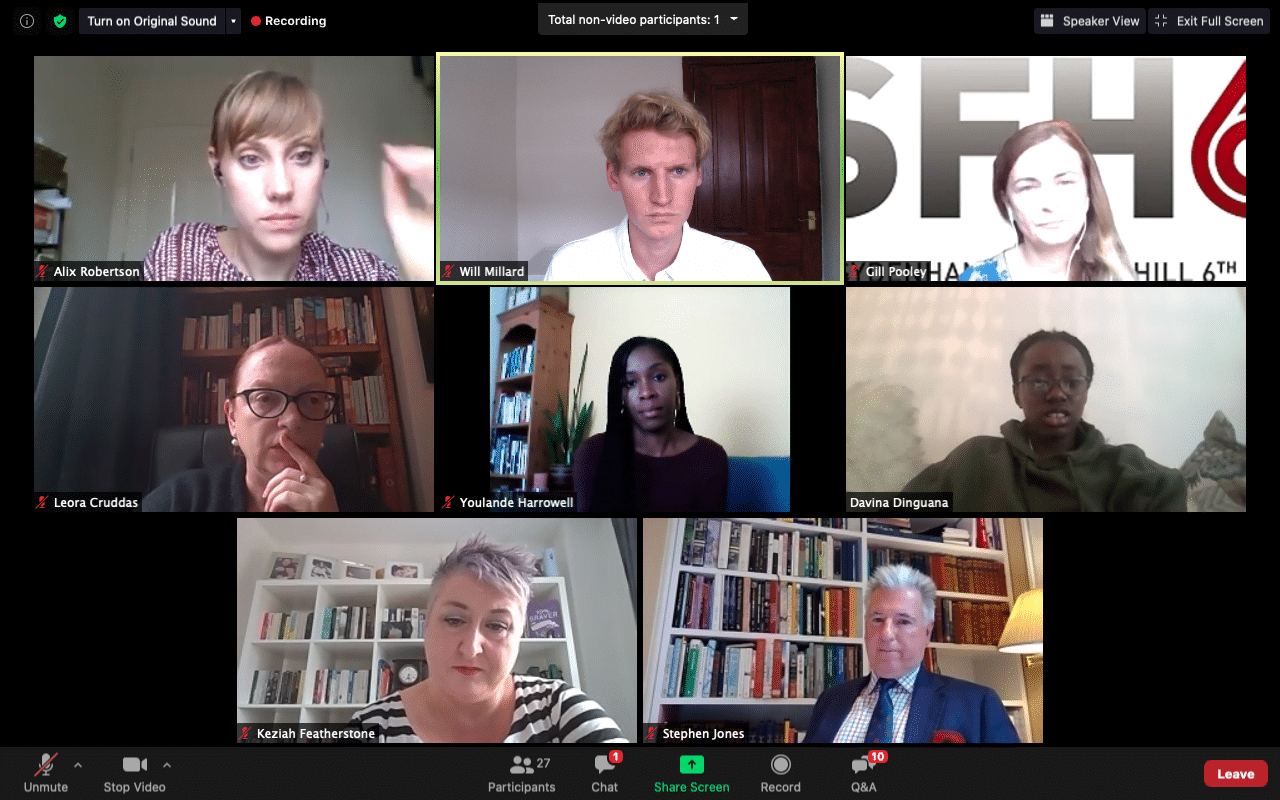How have #Alevels2020 affected teachers and students? CfEY’s A-levels exams seminar
14th August 2020
By Alix Robertson and Will Millard
What’s happened?
Like the weather, this week has been unsettling and at times stormy.
Schools closed in March, and exams were cancelled, pulling the rug from beneath school leaders, parents, teachers and most importantly young people across the country.
Young people across the UK have just received their A-level results. Top grades have gone up, and many have rightly been celebrating. However, many have been left reeling upon the news that nearly 40% of results were downgraded. There’s evidence that this system has disproportionately and negatively affected poorer students.
The day after students received their A-level results in England, a panel of school leaders, experts and a student, told us how they have been affected.
Chaired by CfEY’s Head of Engagement, Will Millard, the panel included:
- Keziah Featherstone – Head of School, Q3 Academy Tipton
- Gill Pooley – Deputy Head, Sydenham School
- Davina Dinguana – Student, Sydenham School
- Youlande Harrowell – Co-Founder, Mindful Equity UK
- Stephen Jones – Warden, St Edward’s School
- Leora Cruddas – CEO, Confederation of School Trusts
What was the impact of Covid on exam results?
The Covid-19 pandemic has resulted in A-levels looking very different this year.
Will set the scene, explaining that, with exams cancelled, teachers instead supplied estimated grades, and ranked pupils within grades, within subjects. Ofqual then standardised these results using among things schools’ historical performance and pupils’ prior attainment.
How are teachers coping?
The collective mood is low. Despite some success stories, teachers are acutely aware of how many students are suffering from feelings of confusion and distress.
Schools and subjects with smaller cohorts have escaped relatively unscathed, raising questions of fairness. Maths, psychology, and biology have been disproportionately affected, and Gill Pooley said her school, which caters for over 1,400 students in Lewisham, had been badly hit.
Gill describes her concern about students as 40% at her school had their grades downgraded, with some being downgraded by two grades #alevels2020
— The Centre for Education and Youth (@TheCFEY) August 14, 2020
Keziah Featherstone saw 25% of results downgraded at Q3 Academy Tipton, but said that – after seeing how other schools have been affected by downgrading – she felt ‘almost relieved’. However, some of her students had their grades dropped to ‘Us’, which is “unacceptable”.
Teachers and students alike miss the face-to-face contact of normal results day, and online meetings with pupils offer only limited consolation.
Panellists discussed the extent to which Ofqual’s standardisation was fair, but said teachers cannot shake the feeling that the downgrading flies in the face of their professional judgement.
Alongside A-levels, many International Baccalaureate results have also been downgraded. Stephen Jones explained that his school is fighting hard to ensure its students’ results are fair.
Teachers and students alike have been missing the face-to-face contact that normal helps with celebrating or commiserating in school on results day. Share on XHow are young people feeling?
Many young people are feeling confused, angry and frustrated, either for themselves or for their friends. Like their teachers, they are facing confusion about what constitutes a ‘valid mock‘.
Our panellist Davina received the A-level results she had been hoping for and secured her place to university. However, she feels unable to properly celebrate her success while some of her friends are dealing with shock and disappointment.
Information from Ofqual and government has been unclear or contradictory, leading to ‘fake news’ spreading on social media. For example, students have felt concerned that by appealing their results they may disadvantage their classmates.
Those such as Davina, who has amazingly secured the university place she wanted, feel unable to properly celebrate their success because friends are dealing with shock and disappointment. Share on XWhat does the future hold?
Pinning hopes on exams in the Autumn is a “distraction”, when the focus should be on sorting out young people’s destinations right now.
Teachers, students and universities are struggling to understand the appeals process. Meanwhile, teachers are worried that young people will lose out on university places while the appeals process rolls on. This may lead to many young people taking unwanted gap years that they have not planned for. Leora Cruddas called on universities to be flexible, and show students leeway.
Schools will face financial consequences if students repeat a year, and Gill Pooley said the government should be looking at how it will support schools through this.
The Scottish government performed a spectacular U-turn last week, reinstating students’ original ‘estimated’ grades. Our panel expressed concern that this will overly inflate this year’s results, which is unfair to cohorts in 2019 and 2021.
What will happen on GCSE results day?
Our panel felt very concerned about next week’s GCSE results. However, Youlande Harrowell said sixth forms and colleges can take steps such as turning conditional into unconditional offers so that students can continue with their studies.
The panel agreed that “we should be erring on the side of generosity” when it comes to students’ futures.
The next question is about what teachers are expecting next week. @YoulandeH says that teachers are feeling very uncertain about GCSE results, however, they are addressing situations positively and supporting their students to mitigate the impact #alevels2020
— The Centre for Education and Youth (@TheCFEY) August 14, 2020
Do we have any reason to be optimistic?
Yes.
Despite overwhelming challenges, our panel gave reasons to be optimistic.
Davina – like many of her peers – is excited to start her degree.
Teachers and school leaders are looking forward to getting back into school, and seeing their pupils again. When it comes to teaching, working remotely just isn’t the same!
Keziah Featherstone said that she is encouraged by communities coming together and making their voices heard on issues that matter to them.
Leora Cruddas concluded by sharing Nelson Mandela’s timeless quote: “Education is the most powerful weapon we can use to change the world.”



Comments